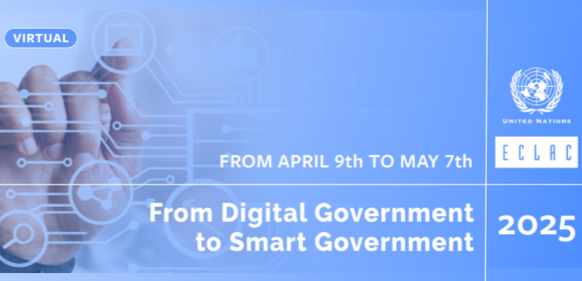ECLAC inaugurates the second edition of the virtual course From digital government to smart government for the Caribbean
Work area(s)
The course, which runs until May 7th, 2025, brings together more than 40 participants from 15 countries.

The Economic Commission for Latin America and the Caribbean (ECLAC), through the Latin American and Caribbean Institute for Economic and Social Planning (ILPES) and ECLAC’s Subregional Headquarters for the Caribbean, launched the second version of the virtual course, From digital government to smart government on Wednesday, April 9th. The course is aimed at the Caribbean subregion and includes over 40 participants from Anguilla, Antigua and Barbuda, Aruba, Barbados, Belize, Dominica, Dominican Republic, Guyana, Haiti, Jamaica, Suriname, St. Maarten, St. Kitts and Nevis, St. Vincent and the Grenadines, and Trinidad and Tobago.
The mail goal of the course is to enhance participants’ capacities in providing solutions to the needs of citizens and organizations, as well as to address future crises – such as those related to climate change – through Digital Government. The course also focuses on incorporating new knowledge to advance evidence-based decision making and data-driven policies, aiming to create public value and pave the way for a resilient Smart Government in the Caribbean subregion.
During the inauguration ceremony, Diane Quarless, Director of ECLAC’s Subregional Headquarters for the Caribbean, underscored that the course responds to the urgent need to strengthen capacities for the digital transformation of the public sector in the Caribbean. She emphasized the importance of advancing towards a smart and resilient government, one that is citizen-centered and data-driven.
Valeria Torres, Chief of the Public Administration and Open Government Area of ILPES/ECLAC, highlighted the course's relevance in the context of the Pact for the Future and the Global Digital Compact adopted by world leaders at the Summit of the Future held in New York in September 2024.
She noted that the Global Digital Compact acknowledges how digital technologies are dramatically transforming our world and that they can bring enormous benefits and help accelerate the achievement of the Sustainable Development Goals—provided this occurs within a strengthened framework of international cooperation that bridges all digital divides between and within countries.
These are precisely the goals of this course, Torres affirmed, underscoring the importance of data-based policies to create public value and close the digital divide.
The training program is expected to empower Caribbean nations in their digital transformation efforts, ultimately contributing to regional resilience and sustainable development.
This initiative is developed in the framework of the project “Resilient and Inclusive Public Management Systems for Sustainable Development in Latin America and the Caribbean” of the United Nations Development Account.
Related content

From Digital Government to Smart Government
The course is organized by the Economic Commission for Latin America and the Caribbean (ECLAC), through the Latin American and Caribbean Institute for Economic and Social Planning (ILPES) and the…
Country(ies)
- Latin America and the Caribbean